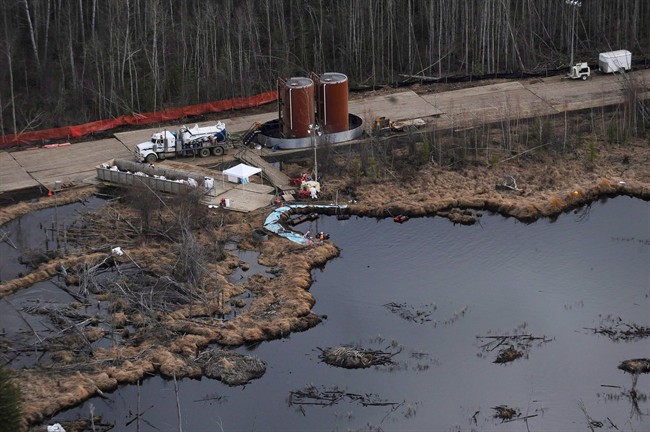Note: Environment Canada emailed us Wednesday morning, two days after our initial query, requesting a correction as the federal charge was laid by the federal government. The change has been noted below.

Pipeline company Plains Midstream has pleaded guilty to three charges relating to two massive pipeline breaks that spilled nearly 5 million litres of crude oil into Alberta waterways, and agreed to pay a combined $1.3 million in fines.
The charges relate to two incidents. The smaller one was a spill on June 7, 2012, where a pipeline owned by Plains Midstream failed, spilling 462,750 litres of oil into the Red Deer River and Glennifer Lake, near the town of Sundre, Alberta.
The other incident occurred on April 28, 2011. Plains Midstream’s Rainbow pipeline near Peace River failed, releasing 4.5 million litres of crude oil into marshland. This was the second-biggest oil spill in Alberta history, according to data obtained from the province’s energy regulator.
The Alberta government and Environment Canada brought two near-identical charges against Plains Midstream for the 2012 incident – one under provincial law and one under federal.
The federal charge is that the company failed to inform authorities without delay of a spill of a deleterious substance into water frequented by fish as required under the federal Fisheries Act; the provincial charge is that the company failed to report the release to provincial authorities as soon as they found out about it, as required under the province’s Environmental Protection and Enhancement Act.
Plains Midstream agreed to pay $400,000 in fines relating to the first charge, and $450,000 relating to the second – just under the maximum fine of $500,000 for the second offence.
Both oil companies and the provincial government have come under fire for taking their time in telling the public about spills; there is no set time frame for doing this and no definition of what kind of spill would require – for example – a public announcement from the province’s energy regulator. (Following a Global News series, the energy regulator began to publish some details of some spills on its website.)
Regarding the 2011 spill, Plains Midstream pleaded guilty to a charge of “failing to take all reasonable measures to repair, remedy and confine the effects” of the spill, as required by the Environmental Protection and Enhancement Act. The company has agreed to pay a fine of $450,000 for this breach – again, just under the maximum fine of $500,000.
Two other charges related to the 2011 spill were dropped: releasing a substance into the environment that may cause a significant adverse effect, and for failing to take all reasonable measures to remediate, manage remove or dispose of the substance as soon as they were aware of the spill.
In an emailed statement Tuesday evening, Plains Midstream said it’s sorry and noted it has taken steps to prevent this from happening again, citing $110 million in environmental cleanup efforts on these two spills and “significant” investment in preventive maintenance between 2010 and 2013, including $4 million for enhanced automated pipeline monitoring.
“We sincerely regret that the incidents happened,” the statements reads. “… We are dedicated to a culture of safety and responsibility.”
But $1.3 million in fines is not enough, said Greenpeace climate and energy campaigner Mike Hudema.
Plains Midstream’s parent company, Plains All American Pipeline, posted $11.6 billion US in revenue between January 1, 2014 and March 31, 2014, according to a news release on its website.
“A $1.3 million fine is hardly a signal to Plains Midstream or a signal to Alberta’s very problematic pipeline industry that they need to start solving some of their ongoing pipeline issues,” Hudema said. He’d like to see higher fines for violations as well as other kinds of consequences.
“The regulator really needs to look at how many chances do they give a pipeline company before they take more severe action like potentially pulling its license.”
According to the agreed statement of facts between the Alberta government and Plains Midstream, during the Red Deer River incident the company took roughly three hours from the time it became aware of the problem to contact the energy regulator. By then, members of the public had already noticed and reported a smell.
Global News interviewed residents in the Sundre area in 2013. One, Dennis Overguard, said he was recovering from heart surgery at the time of the spill. He said the fumes from the spill aggravated his condition and sent him to hospital. He also said that he spent months living in a bed-and-breakfast at Plains Midstream’s expense because he couldn’t return home after the spill.
The statement of facts mentions a family, possibly the Overguards, who did not return to their residence for a number of weeks after the incident.
Ila Johnston, another resident, also told Global that she had to go to the hospital following the spill. In her case, the smell made it difficult for her to breathe.
Read more: The Red Deer River spill one year later
The statement of facts confirms many area residents went to the hospital as a result of the spill. 10 deceased birds and 20 fish were collected by wildlife officers and Plains employees from the area, though their cause of death was not conclusively determined.
The statement of facts relating to the major 2011 spill confirms Plains Midstream restarted the leaking pipeline four times after problems were first detected, likely exacerbating the spill. A school in the nearby Lubicon Cree community of Little Buffalo was closed for a few days following the incident, although the statement says that, “No information exists to show if anyone in the area was at risk of any harm or suffered any health effects.”





Comments